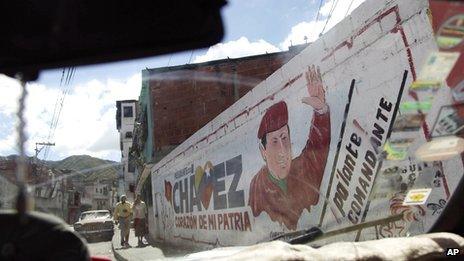Hugo Chavez inauguration: Conflicting views
- Published

Mr Chavez has not been seen in public since his surgery on 11 December
The inauguration of Venezuelan President Hugo Chavez for a new six-year term has been postponed.
Mr Chavez, re-elected in October, had been due to take the oath before the National Assembly on 10 January.
The government announced on Tuesday that, as set out in the constitution, he would be sworn in by the Supreme Court at a later date.
The opposition, also basing its argument on the constitution, argues that Mr Chavez must be inaugurated on 10 January or step aside.
The constitution does not state explicitly what should happen if the ceremony does not take place on 10 January. And political analysts as well as government and opposition figures have differing interpretations.
Absolute absence?
Some analysts and constitutional experts consulted by the BBC said that if Mr Chavez did not appear on 10 January, it might be necessary to declare his "absolute absence" and call elections within 30 days.
They argue Mr Chavez's mandate would come to an end without having been formally renewed.
Article 233 of the constitution refers to the "absolute absence" of a president, meaning he is deemed permanently incapacitated. Some analysts argue that a wide interpretation cannot be placed on this article as it does not expressly refer to the non-appearance of the elected president on the day of the inauguration.
Of the conditions listed in Article 233 for "absolute absence", the closest to Mr Chavez's condition could be permanent physical disability, which must be declared by the Supreme Court with the approval of the National Assembly; or abandonment of the office of president, which has to be declared by the legislature itself, and which is unlikely.
Or temporary absence?
Other analysts as well as many members of the opposition are arguing that President Chavez should be declared temporarily incapacitated, according to Article 234.
This article, which refers to the first four years of a president's mandate, says the vice-president can take over for up to 180 days.
However, the opposition say this does not apply as Mr Chavez's current term ends on 10 January and the Speaker of the National Assembly, Diosdado Cabello, should take over instead as interim leader.
This is dismissed by the government. It argues that there exists continuity in Mr Chavez's mandate as he is a re-elected leader.
Officials are also citing Article 231, which says that if for any reason, the president cannot be sworn in before the National Assembly, the president can take office before the Supreme Court.
Mr Cabello and other members of the government say that the constitution does not specify a time and place for the Supreme Court justices to swear in the president, thus allowing Mr Chavez to be inaugurated at a later date.
But some constitutional experts cast doubt on this argument as it appears in the same paragraph that refers to the 10 January (implying it should take place on that day).
Elections?
Although Mr Cabello says the opposition is using the 10 January as an argument to get rid of Mr Chavez politically, this does not appear to be their intention.
In fact, an early presidential election would pose a challenge for the opposition, which suffered heavy election losses last year, both in the presidential and state governorship polls.
Moreover, the opposition currently has no official presidential candidate.
Henrique Capriles, who lost in October to Mr Chavez but was re-elected governor of the key state of Miranda in December, might be a contender.
But some observers believe his presidential defeat has seriously damaged his chances of running as an opposition unity candidate again.